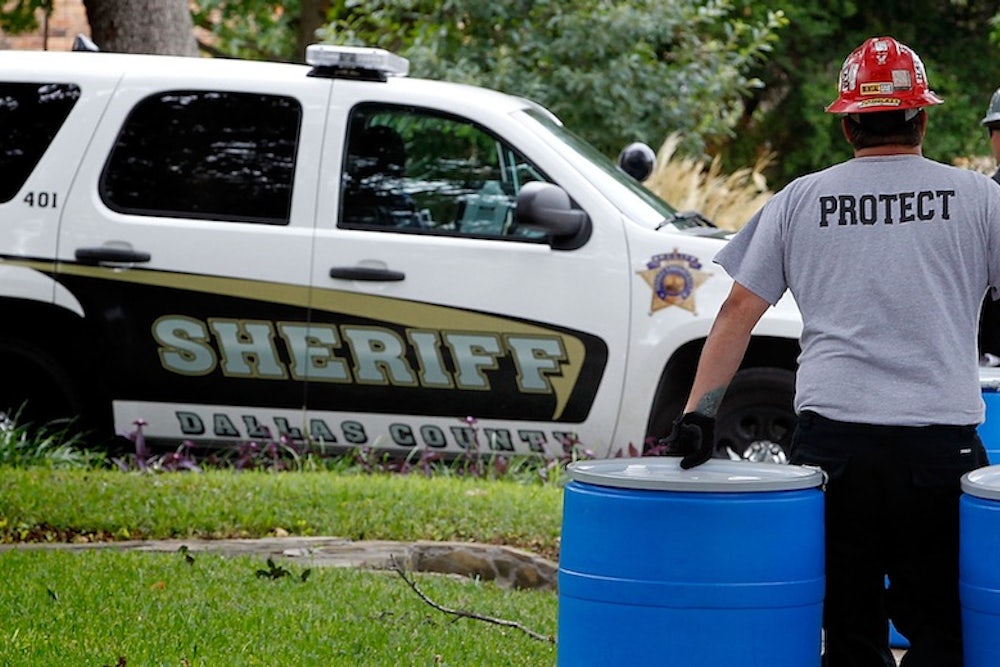On Wednesday, the Centers for Disease Control and Prevention announced that Amber Vinson, the second Dallas health care worker with Ebola, had flown from Cleveland to Dallas on the day before she reported symptoms. Vinson apparently showed no symptoms while on the return flight to Dallas, meaning fellow passengers are at extremely low risk. Still, CDC Director Tom Frieden said in a press conference, "she should not have been on that plane."
It's unclear if the CDC or officials ever instructed the Texas Health Presbyterian Hospital workers caring for Thomas Duncan to avoid crowded areas and not to fly. Vinson, like up to 75 other health care workers who had contact, were told to monitor themselves for early signs of symptoms, like fever. Going forward, Frieden said, the CDC will take steps to ensure no one else in a similar situation travels outside a closed environment—though he didn’t specify what steps he had in mind and neither the CDC nor Department of Homeland Security returned requests to explain this statement.
But if we don’t know what the government will do to stop high-risk people from traveling and potentially spreading Ebola, we do know what it could do if circumstances got truly dire. The government could force people to stay put. It could even force American citizens who show no signs of the disease to stay away from the public. It’s the power to quarantine, and it comes from laws authorizing dramatic, sometimes drastic action in order to avoid a true public health crisis.
The power is scattered among different agencies, spanning federal, state, and local governments. The CDC, for example, has limited authority to quarantine during international and interstate travel under section 361 of the Public Health Service Act. That provision authorizes the U.S. Secretary of Health and Human Services to "take measures to prevent the entry and spread of communicable diseases from foreign countries into the United States and between states." President George W. Bush designated Ebola as one of these communicable diseases in 2003 in an executive order.
But historically it hasn’t been the CDC that issues quarantine orders. It’s state health departments. As the CDC's website states, laws "can vary from state to state and can be specific or broad. In some states, local health authorities implement state law. In most states, breaking a quarantine order is a criminal misdemeanor." To make sure the quarantine is effective, local officials can send law enforcement to check in or opt for occasional visits from health workers.
Of course, quarantines are also very rare. Authorities generally prefer to make recommendations and rely on people to follow them in good faith. "In the U.S. we tend to try to do a softer approach, not be too coercive, and not scare people so as to drive the epidemic underground," says Lawrence Gostin, a Georgetown University professor and Director of the World Health Organization Collaborating Center on Public Health Law and Human Rights.
The exceptions are situations in which people are ignoring recommendations. And that’s already happened at least twice in the Ebola saga. In New Jersey, the state Department of Health began to enforce a quarantine several days ago, after an NBC journalist had picked up some food after she and other crewmembers returned from Liberia with a sick coworker and agreed to avoid all public contact for 21 days. Now, police have patrolled near Dr. Nancy Snyderman's home by the hour. “It’s really just to make sure that there’s no chaos out there," a Princeton, NJ town administrator said. "We can keep an eye on the house, if cars are leaving."
In Dallas, Texas, four people who were inside the apartment when Duncan became ill are also under quarantine. But local authorities have handled it in a way that highlights the potential danger of the approach. Duncan's partner and her family were trapped in a contaminated apartment for days, amid soiled bedsheets and clothes, before they finally could move to a clean apartment. Gostin told me this may be unconstitutional. "That's unacceptable to subject people who are quarantined to that kind of risk to their health," he said.
Stories of more high-risk people traveling and, of course, stories of more Ebola cases could build public support for more quarantines. But experts warn that there is a downside to overdoing it. Mark Rothstein, a law professor at the University of Louisville, wrote in a recent analysis of quarantines that they may have had limited effectiveness when widely used in Canada and Asia in a 2003 SARS outbreak: "With several hundred thousand individuals placed in quarantine and relatively few of them later developing SARS, local public health officials later acknowledged that the response was disproportionate to the threat. Thus, the paradox of quarantine and other social distancing measures is that they may be effective in fighting a disease outbreak, but they can be applied too broadly, resulting in a variety of social harms, including economic disruption, personal isolation, and even violence."
